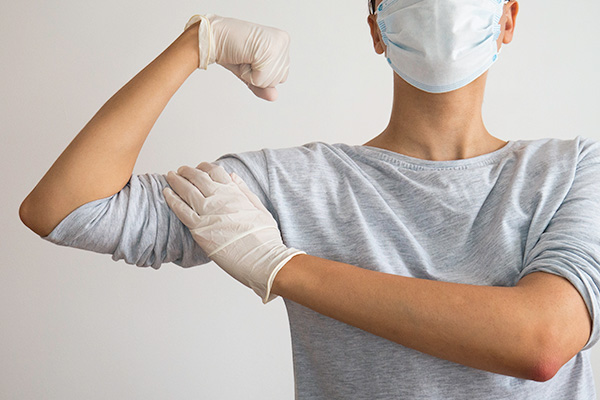
Diligence (Still) Required: Reopening Doesn’t Mean Lower Risks
By Tessa Crume, PhD, MSPH
(Note: ABMP connected with epidemiologist Tessa Crume, an associate professor in the Epidemiology Department at the Colorado School of Health at the University of Colorado Anschutz Medical Campus, to get her expert advice on this question.)
Q: As schools and businesses reopen, what would you tell people about letting down their guard relative to COVID-19?
We are all growing weary of the inconvenience, disruption, and sacrifice that COVID-19 has placed on our lives. Given the far-reaching impact of this pandemic, not only on human lives, but also on our personal and national economies, it is not surprising that mask-wearing has come to represent a social duty to some and offensive or an oppressive action to others. We must trust our own judgment and step up our mask game.
As case numbers are surging throughout most of the US, it is my scientific opinion that the spread of COVID-19 is just beginning. The decisions to lift stay-at-home measures and relax social distancing mandates in states and communities was based, in part, on the devastating economic and social impact to individuals and families. Population-level public health measures must always weigh both the anticipated benefit as well as the cost. The cost of widespread closures in late spring were steep and borne disproportionately by the most vulnerable members of society.
While “stay-at-home” directives were designed to protect individuals from COVID-19, the home is not a safe place for domestic violence victims, the majority of whom are women, children, and LGBTQ+ individuals.1 The massive spring school closures had no precedence in the history of the United States and were difficult for all families, but were profoundly more challenging for the most disadvantaged students, 7 million of whom lived in homes without the internet capabilities needed to access their virtual lessons.2 I mention these stark realities to convince you of the strong rationale for communities and states to reopen.
But, we can’t equate reopening to a lower risk for contracting SARS-CoV-2, at least not in the US. We are seeing record numbers of new cases each day.3 Many scientists fear we are entering a second wave of infection. Exponential growth of cases is now seen across nearly the entire southern part of the country. Societal closures in the spring were meant to buy us time to increase health-care capacity. Let us hope that has happened, because winter is coming.
So, to answer your question, no, it is not time to relax. Many of us have returned to work places with new precautions in place. It is important to have social interaction and maintain connections with friends and family. Summer is a great time to socialize outdoors where air circulation, ultraviolet light (from the sun), and maintenance of a 6-foot distance, likely pose little risk for transmission. But don’t let down you guard. Practice social distancing, wear a mask, wash your hands frequently, and use hand sanitizer when you can’t. When you socialize (and you should for your mental well-being), keep groups small, don’t share food, and bleach the heck out of frequently touched surfaces.
Notes
- C. Lopez and A. Bro, “A Double Pandemic: Domestic Violence in the Age of COVID-19,” Council on Foreign Relations, accessed June 26, 2020, www.cfr.org/in-brief/double-pandemic-domestic-violence-age-covid-19.
- M. Castelo, “Continuing Remote Learning for Students Without Internet,” EdTech: Focus on K–12, accessed June 2020, www.edtechmagazine.com/k12/article/2020/04/continuing-remote-learning-students-without-internet.
- The COVID Tracking Project, accessed July 2020, www.covidtracking.com/data.
author bio
Dr. Tessa Crume is an associate professor in the Epidemiology Department at the Colorado School of Health at the University of Colorado Anschutz Medical Campus. Her research focuses on the development and utilization of public health surveillance systems to understand the burden of disease. She has been an academic researcher since 2011, before which she worked for a decade as an applied epidemiologist at the state and federal level, analyzing surveillance data and evaluating public health impact. She has taught the core epidemiology class at the Colorado School of Public Health for nine years.